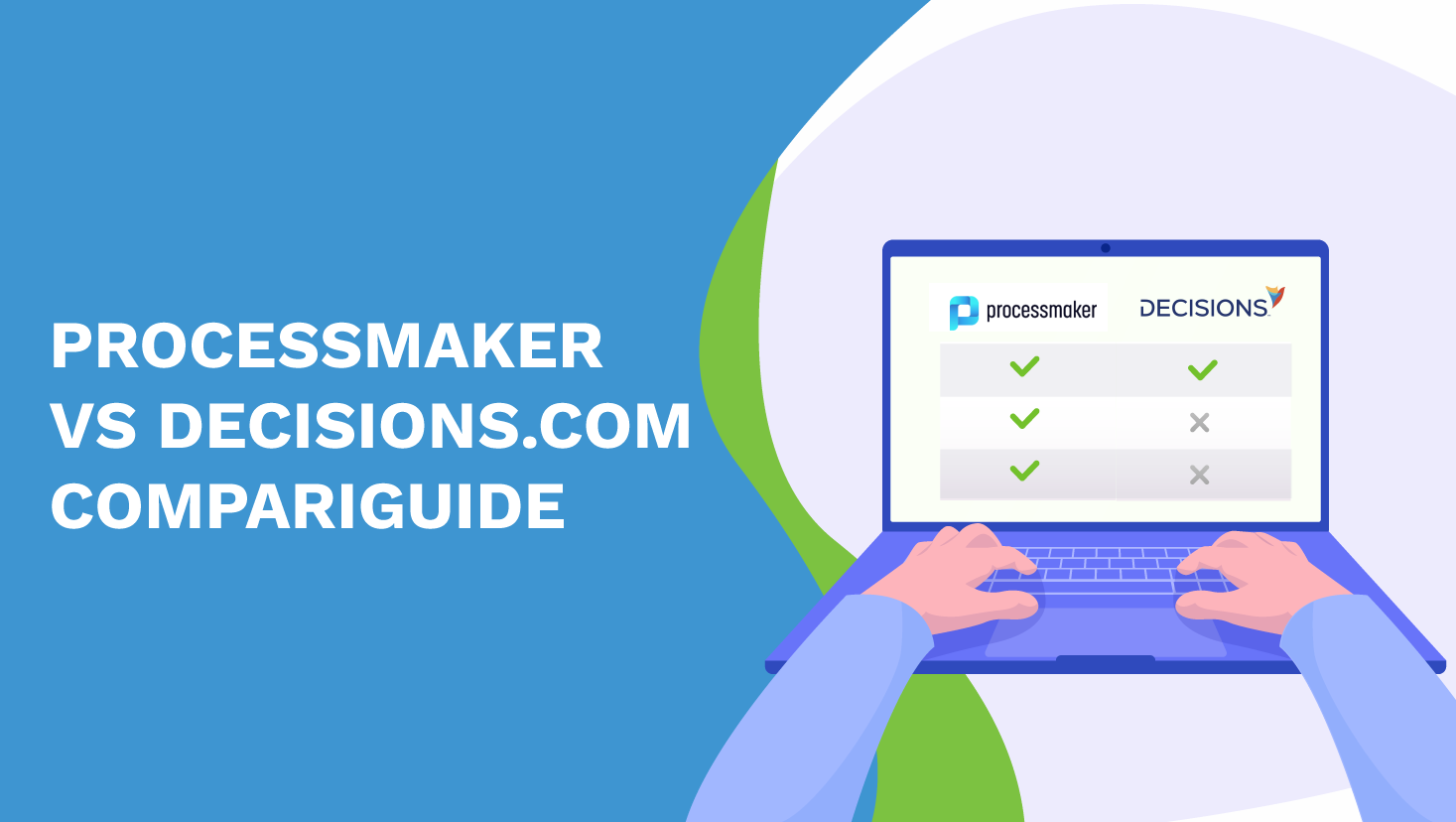Deciding between ProcessMaker and Decisions?Download our free comprehensive comparison guide
Unlike no-code solutions such as Decisions, ProcessMaker's low-code BPM can automate and scale complex workflows that communicate with multiple systems and stakeholders.
 |
vs |  |
|---|---|---|
|
4.4/5 468 reviews |
QUICK OVERVIEW |
4.5/5 38 reviews |
Get Your Guide

About the Guide
This document will concentrate on two top BPMs platforms we reviewed: Decisions and ProcessMaker. We conducted thorough reviews of both platforms that highlighted how each handled the following: process design flows and optimization, business rules, process variation, visualizations, and the ability to rapidly develop and deploy solutions. Both are used by many of the world’s largest organizations to automate core business processes to achieve the highest levels of efficiency.
| Reviews | |||
|---|---|---|---|

| vs | 
| |
 |
4.3/5 23 reviews | 4.7/5 9 reviews | |
 |
4.3/5 270 reviews | 4.4/5 13 reviews | |
 |
4.5/5 175 reviews | 4.4/5 16 reviews | |
Decisions Pros & Cons
| Pros | Cons |
|---|---|
| Promoted as a truly “code-free” platform. The highly visual Decisions Flow Designer serves up a library of over 2,000 ready-togo logic steps. This vast offering makes it easy for non-programmers to find the integration or action they need to create a fully automated process. |
Challenging to work outside of the platform’s prebuilt “steps.” Decisions offers a massive library loaded with thousands of prebuilt steps. However, wading through a staggering number of steps can be time-consuming and confusing for logic beginners. Workflows that require even the smallest modifications to the prebuilt collection are taxing for low-tech users to tackle. |
| Personalize the entire suite with drag-and-drop tools. Using the Decisions suite, users can design more than just automation processes. Drag and drop pre-existing fields to create simple web and mobile forms, or slide dynamic analytics data into your desired dashboard using the Page Designer. |
Considerably clunky as you add more logic. Users note that Decisions logic is easy to manipulate at the start, but once you start to add more inputs, outputs, and data to the mix, the intuitiveness quickly starts to deteriorate. |
| Quality customer service. Users praise the level of customer support provided by Decisions. Support is always available to help with challenges and bottlenecks. Weekly webinars walk through fresh features and teach new users how to navigate the platform. |
Sky-high pricing for small and medium-sized businesses. Decisions divvies up various features across two pricing tiers; Standard and Enterprise. Even the Standard software tier is nearly 3x more expensive than the ProcessMaker platform, and users can rack up even more additional charges when they opt for the cloud option. |
ProcessMaker Pros & Cons
| Pros | Cons |
|---|---|
| True Low-Code Environment but with additional Developer tools. Design and deploy without coding knowledge needed. However, for developers that want to create custom scripts and packages to run in their environment, ProcessMaker has a full featured web IDE for designing scripts in almost any programming language. |
More Coding Knowledge Equals Better Feature Usage. An IT professional does have to write the original script tasks that serve as the building blocks for many processes, which can then be reused indefinitely by business users. |
| Pricing. Reportedly it is one of the more affordable enterprise BPM solutions. |
Single Cloud Support. ProcessMaker seems to lean toward AWS at present and its new solution is not marketed for On Premise. However, ProcessMaker is offering a unique hybrid solution with the ability to store sensitive data on premise with a connection to your cloud deployment. |
| Thorough Training and Professional Services, and Support. Numerous reviews across G2 Crowd, Capterra, and Gartner Peer Insights cite positive reception of training and support as a major factor in sticking with ProcessMaker. |
Technical Installation on Premise. ProcessMaker is built for the cloud. For users that want to run the open source on premise they will find installation difficult and all the cool enterprise features are missing in the open source. The open source core, however, is well documented and ideal for inclusion in other enterprise products. |
Discover how leading organizations utilize ProcessMaker to streamline their operations through process automation.